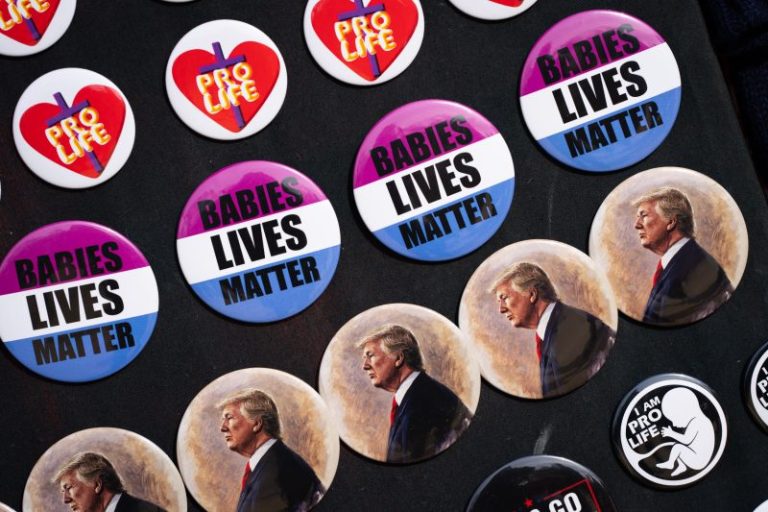Former president Donald Trump disappointed some supporters this week when he appeared to rebuff pressure to back a federal ban on abortion, declaring in a video that “now it’s up to the states to do the right thing.”
But antiabortion activists say they remain confident that Trump will advance their cause if he wins a second term in the White House. With Congress unlikely to pass a federal ban, activists have focused on other ways a Trump administration could curtail access to abortion — by rolling back President Biden’s policies, defunding abortion providers, and placing new restrictions on the pills now used in more than half of abortions nationwide.
“The votes just aren’t in Congress to do it,” Carol Tobias, the president of National Right to Life, said of a national ban. “So we are looking at the more practical, effective things that can actually be done by a pro-life executive branch.”
Trump’s actions in his first administration offer a partial guide. He and his officials prohibited certain federal funding from going to groups that refer patients to abortions, reinstated a ban on U.S. aid to nongovernmental groups abroad that promote abortion as an option, and sought to allow health providers, insurers and employers to refuse to provide or cover the procedure if it violates their beliefs.
“I would be very happy if he came in and again focused on those things, ” Tobias said.
Asked about Trump’s support for federal actions on abortion besides legislation, campaign spokesperson Karoline Leavitt said Trump “could not have been more clear. These are decisions for people of each state to make.”
Trump has toggled between touting and downplaying his central role in ending Roe v. Wade by appointing three conservative justices to the Supreme Court. The former president has said he is proud of that legacy but is also keenly aware of the political fallout for Republicans up and down the ballot. In the months before his video announcement Monday, Trump privately polled advisers on the idea of a 16-week ban, according to several people who spoke with him, but ultimately decided to call abortion a state issue. Advisers and other Republicans had emphasized the political risks of endorsing a national standard.
Biden is focusing heavily on abortion in his case for reelection, blaming Trump for unpopular restrictions that snapped into effect post-Roe. Voters have repeatedly backed abortion rights in state-level referendums, and recent court rulings in Florida and Arizona — which allowed some of the country’s strictest bans to take effect — have helped keep the issue front and center in 2024.
Democrats have emphasized that Trump did not rule out signing a national abortion ban in his statement this week, and some opponents of the procedure remain hopeful that Trump would approve antiabortion bills if they made it to his desk.
But conservatives are aware of the steep hurdles to any federal legislation on abortion, given the potential for voter backlash and the 60 votes required in the Senate to overcome a filibuster.
Some potential actions are laid out in a lengthy guide published by Project 2025, a conservative effort led by the Heritage Foundation to recommend policies and personnel for the next president. A chapter on the Department of Health and Human Services is written by Roger Severino, a former Trump administration official, is largely focused on abortion policy changes that the next president could enact through federal agencies.
Severino argues that there were flaws in the federal government’s decades-ago approval of mifepristone, a key part of medication abortions, and calls on a future administration to withdraw it — though such a dramatic move would face legal hurdles. The Food and Drug Administration could also place restrictions on the pills, Severino writes — for instance, by reinstating a requirement that patients obtain them in person rather than through the mail.
Trump’s campaign did not respond to a question about the candidate’s position on abortion pills and the push to revoke mifepristone’s approval.
Abby Johnson, an antiabortion activist, said that Trump’s appointments will be key and that “we in the movement are all expecting Christian conservatives.”
Roe was still the law of the land during Trump’s presidency, limiting the actions he could take on abortion. But abortions opponents saw plenty to applaud.
Trump reinstated, and expanded, the “Mexico City policy” — what critics call the “global gag rule” — that bars federal funding to foreign nongovernmental groups that “perform or actively promote” abortion. Republican administrations since Ronald Reagan have adopted the rule, but Democratic presidents have scrapped it.
Trump’s administration also barred federal family planning money from going to groups that refer patients for abortions, among other restrictions. That affected groups like Planned Parenthood, the country’s largest provider of reproductive health services, and prompted a court battle; the Supreme Court dismissed the case after the Biden administration reversed course.
Trump’s Health and Human Services Department also focused on what supporters call “conscience protections” for health-care workers who object to performing abortions. Critics argued that the approach would compromise care by, say, allowing a paramedic to refuse to drive a woman to a procedure in conflict with their religious or moral beliefs.
Many antiabortion activists responded to Trump’s Monday statement by emphasizing that there is a federal role in abortion, whatever the fate of national legislation.
Kristan Hawkins, the president of Students for Life, shared a long thread of action items on social media: Appoint supportive people to the Departments of Justice and Health and Human Services, among others. Reverse a long list of Biden-era policies. Direct the Education Department to end distribution of abortion pills on college campuses.
“The Trump statement from today is done,” Hawkins wrote. “Now, it’s time for the Pro-Life & Conservative movement to list out what we can do, when we win in November, to protect babies and mothers from the predatory abortion industry.”
Michelle Boorstein contributed to this report.

